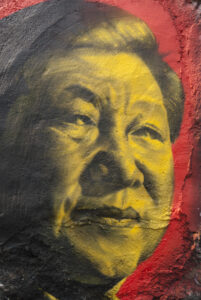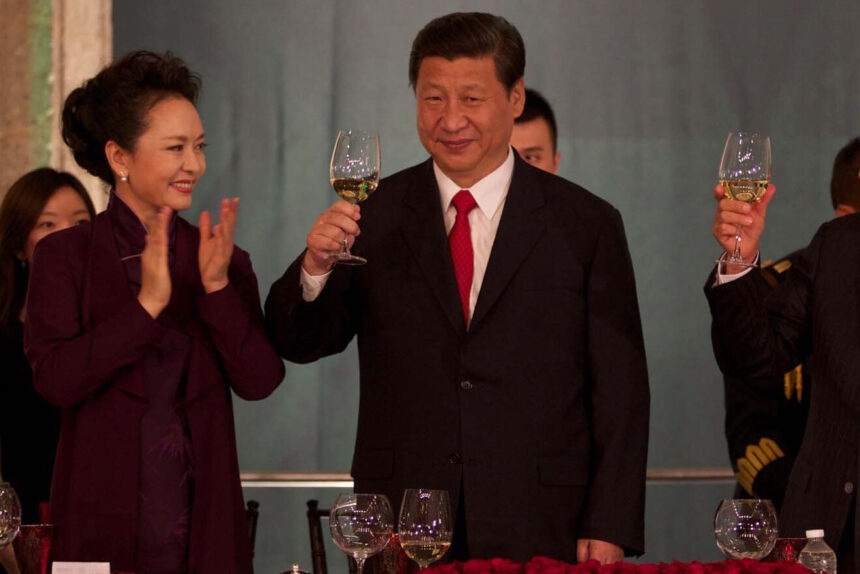In the early 18th century, China was the most populous country and had the largest economy in the world. In land mass, it was second only to Russia but more firmly integrated and more efficiently run by a seasoned civil-service machine. China was stable and seemingly powerful, safe at last from periodic invasions from the central Asian steppes, protected by a deep buffer zone in the west, by the Himalayas to the southwest, and by the docile tributary states to the south.
The Middle Kingdom proved unequal, however, to the sudden Western challenge in the 19th century. Unlike Japan—which, after Commodore Perry’s foray into the Bay of Tokyo, quickly grasped the need to modernize and soon became a great power in its own right—China was reluctant to institute reforms and suffered a “century of humiliation,” from its defeat in the First Opium War until Mao’s victory in the Chinese Civil War over 100 years later.
For the best part of that period, China was an object of Western exploitation and Japanese aggression. These were traumatic experiences, and China’s decay and humiliation were far more rapid and brutal than those suffered by other declining empires such as Spain after the Peace of Westphalia, Turkey after the second siege of Vienna, or Britain after the Great War. China’s collective memory of that era must not be overlooked in any assessment of the country’s current policies and future ambitions.
Those ambitions were clearly articulated at the 20th National Congress of the Chinese Communist Party (CCP), held in Beijing in October: stability and prosperity at home under the Party’s unyielding control, ever greater influence, and capacity for power projection abroad, and diplomacy geared to reassure the world—mostly its non-Western majority—that China is committed to the emergence of a new, post-hegemonic global order.
These goals may seem like a continuation of China’s grand strategy, outlined by Xi Jinping at the Party’s previous congress, five years ago. At that time, Xi announced that the Chinese nation “has stood up, grown rich, and is becoming strong.” He promised to abide by the “dream of national rejuvenation,” which should turn China into a “world-class power” by the centennial of the founding of the People’s Republic in 2049.
These were “realist” strategic objectives, which probably would not have been very different had Chiang Kai-shek won the civil war and his successors were now in power in Beijing. Not even the emperors and mandarins from the Ming dynasty would find this set of objectives very different from their own goals half a millennium ago. The 20th Congress did, however, bring two major novelties.

the faces of Xi Jinping and
Mao Zedong (Artist: Xue /
Abode of Chaos contemporary
art museum in Lyon, France)
The first is Xi’s assumption of complete control over the Party, the state, and the military. The concentration of power that he accomplished in October 2022 has no precedent in China’s politics in the 46-year period since Mao died, in 1976. By securing the third mandate as the CCP General Secretary and packing all key bodies with his loyalists, indicating the unstated but increasingly clear intent to remain at the helm for the rest of his life, Xi has formally ended China’s three-decades-long era of consensus-based elite-interest management.
That unique period in the history of Communist regimes, when the man at the top acted as the first among equals, was reflected in the smooth succession of “paramount leaders,” from Deng Xiaoping (who exercised power from 1978 until 1989 without formally holding any key party or government post) to Xi’s two predecessors at the head of the Party, the state, and the military—Jiang Zemin and Hu Jintao—and finally to Xi himself in 2012.
A veteran European diplomat, who served in Beijing at the time of Xi’s first appointment as the CCP’s secretary general, told me there was no indication at that time that one day Xi would change the rules of the game so thoroughly. In his early days in power, Xi was feted in Chinese media as a modest man of the people who shuns the usual trappings of his position. He started his tenure by forcing the party elite to practice austerity, which was meant to address rising public anger over the lavish lifestyles of their leaders, and a campaign against corruption by officials who placed, as he put it, “undue emphasis on formality and bureaucracy.”
That era is clearly over. The anti-corrupion drive was ultimately used to weed out Xi’s real or perceived opponents. Having completed that task, he has reverted to the Maoist model of power concentration, which also characterized the Soviet system. The new seven-member Politburo Standing Committee, formally the most important political body in the country, is now packed by Xi’s loyalists. None of them have the capacity (or likely the will) to develop an independent power base. The same applies even more to the 24-member Politburo, which has been reduced to Xi’s rubber-stamping echo chamber, and to the 200-member Central Committee.
While facilitating resolute decision-making in pursuing the leader’s grand strategy, this model has many inherent drawbacks, as China experienced to her peril in the chaotic years of Mao’s cultural revolution in the late 1960s. The model creates potentially destabilizing problems of succession (as manifested after Stalin’s death), the threat of major crises if the leader miscalculates (as regards Cuba in 1962, which contributed to Khrushchev’s ouster), and the risk of eventual system sclerosis if the aging leader remains at the helm—as Brezhnev did—long after passing his prime.
For now, however, the 69-year-old Xi looks strong, fit, and able to take advantage of geopolitical opportunities presented in an increasingly unstable world. Russia’s vulnerability, manifested in the war in Ukraine and exacerbated by Western sanctions, is one of those opportunities. It has the potential to make China the dominant party in its partnership with Moscow and the paramount power in the Eurasian heartland, the panregion with immense natural resources and huge, sparsely populated territories east of the Urals.
The Han nation, to which over nine-tenths of the People’s Republic inhabitants belong, subscribes to the traditional notion that their rulers’ “heavenly mandate” is manifested in the country’s stability, safety, and prosperity. Those three pillars of legitimacy remain intact for now, and in the Confucian paradigm, they merit obedience and loyalty in return.
The second novelty at the 20th Congress—less spectacular than Xi’s consolidation of near absolute control but which is significant for the global balance of power—is the rising importance of the Central Military Commission (CMC), China’s de facto general staff and ministry of defense blended into one. The Commission is composed of Xi, five generals, and an admiral. The CMC commands all branches of the People’s Liberation Army (PLA), while the Ministry of National Defense is mainly in charge of the military-diplomatic relations with the outside world.
Four members of the CMC have been replaced by officers who are dubbed in the media as “Xi’s action men” because of their experience in the fields that would be essential to any plans for the invasion of Taiwan. Of particular significance is the appointment of General He Weidong, former commander of the Eastern Theater Command, as one of two CMC vice chairmen. This placement reflects a fresh commitment to the PLA’s ability to conduct complex combined-arms operations, an area of reputed expertise for General He.
Xi insists that no invasion of Taiwan is imminent, but he has also said that unification will happen one way or another in the years ahead. His pledge to create a “world-class fighting force,” supported by the second largest military budget after the United States, will focus in the years ahead on the expansion of China’s ballistic missile arsenal, on the navy (especially aircraft carriers), and on overseas outposts. “We will work faster to modernize military theory, personnel and weapons,” Xi told the Congress. “We will improve the strategic capabilities of the army,” with its complete modernization now set for 2027.
After the 20th CCP Congress, the United States will face a People’s Republic of China that is more autocratic, more assertive, and more determined to resist containment than since the Korean War. Correspondingly, in view of the current U.S. administration’s continued quest for full-spectrum dominance, the geostrategic equation in the Indo-Pacific panregion is likely to become more precarious than ever before.
A few weeks after the Congress, Xi and Joe Biden met to discuss a number of difficult topics, including Taiwan. In a separate statement after the meeting, Xi called Taiwan the “first red line” that must not be crossed in U.S.-China relations.
For U.S.-Chinese relations to be managed without the danger of a major armed conflict, in the short-to-medium term, it is necessary for Washington to discourage the leaders of Taiwan from contemplating formal independence. After the CCP Congress enshrined in its constitution opposition to Taiwanese independence, it is clear that any such declaration by Taipei would mean the crossing of a red line, which the leadership in Beijing would not tolerate.
Over the past three millennia the world has seen a succession of major conflicts resulting from the rivalry between a status quo power and a rising challenger. There is nothing inevitable or preordained in international relations, however, as demonstrated by the rapid and peaceful dissolution of the Soviet Bloc. The notion of Thucydides’s Trap, wherein the established power and the rising power must confront each other in war, can be avoided if both China and the U.S. learn to balance the costs and benefits of their actions with prudence and realism.
The Chinese are well versed in that art, but those who currently lead America are not. It is not in the American interest to risk an all-out war with China over who rules a distant island in the South China Sea. Its form of governance is irrelevant to the security and well-being of the United States. In order to accept this reality, the planners in Washington need to discard the notion that every spot on our planet needs to be treated as relevant to American security. But such a concession is for them a tall order, as we have seen in Ukraine. We therefore have ample reason to be apprehensive of the times ahead.



Leave a Reply